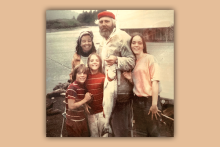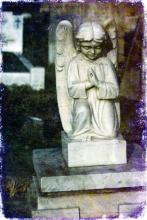eulogy

IT'S AN IMPOSSIBLE task to write and offer a eulogy for one’s father. When a father dies — especially a good one — it’s like mountains crumbling, the sun going out, like a tsunami. There is life after all these things — but essentially a world is ending. It is catastrophic.
And yet. We also hold the ancient wisdom that we are made of ash and the breath of God and to ash and the breath of God we shall return.
John Henry Berger, son of Catherine Helena Gingrich and Henry Joseph Berger, has returned to ash and the breath of God.
While sorting through my Dad’s den, we found one file folder marked “funerals.” In it was a copy of a scripture passage that he had starred and highlighted. It begins, “Happy the one who has found a woman of worth. Her value is far beyond rubies. Her husband trusts her judgment; therefore he does not lack income. She brings him profit, not loss, all the days of her life.” In it we hear his humor and his wisdom. Even when he wasn’t acting out of his best self, he knew he had married Barbara Ely Bird, a strong-willed woman of worth, warmth, wisdom, and humor, one whose value is far beyond rubies or precious jewels. Dad loved Mom.

For some months now, I have been ruminating on the writer John Podhoretz’s eulogy in Commentary magazine for his sister Rachel Abrams upon her death, from stomach cancer, at age 62. Commentary effectively being the Podhoretz family house organ, and the Podhoretzes effectively being the mythological family of the origin of neoconservatism, the essay would be of interest to anyone interested in cultural and religious sociology — or at least to me.
I, too, come from a family that has also tended to think of itself in somewhat mythological, contrarian terms — This is what Langstons are like — so a meditation from the heart of another large, bustling family is an immediate and natural draw for me.
But lay that all aside. The eulogy wins, and haunts, because it is the passionate remembrance of a sister by her brother. Despite their being part of a prominent East Coast family, its focus is relentlessly on the small acts of family and home that transfigure quotidian existence. Podhoretz dwells lovingly on Rachel as a housewife, a lifetime foul-mouth, an exuberant and dedicated mother, an artist, and finally a writer who let loose with political commentary in her late fifties as online blogs began gathering steam.
“I loved you, Rachel,” he concludes poignantly, in words I could read over and over. “I liked you. And oh, oh, oh, how I admired you.”
So much of that poignancy is derived from direct address to his sister, who is no longer there to receive it. Having just hit 45, Dante comes to mind: midway-through-the-journey-of-our-life-I found myself within a dark wood for the right way had been lost. Who can know how our days are numbered? The lesson for me is that I should tell of how I love my brother John, even as he lives.